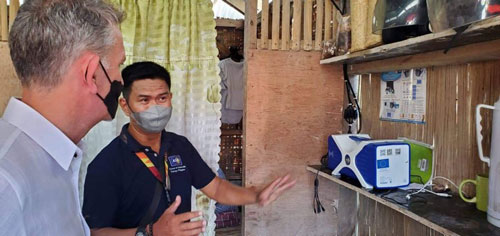The European Union (EU), the World Bank (WB) and the National Power Corp. (NPC), formally turned over 30,500 units of solar home systems (SHS) in a ceremony in Davao City last Monday.
The EU said the project involved a grant of as much as 18.4 million euros equivalent to P1.06 billion and benefitted households in the franchise areas of five electric cooperatives (ECs) in Bukidnon, Sultan Kudarat, Davao del Sur, Cotabato and South Cotabato.
The EU said the amount is also part of the larger P3.83 billion Access to Sustainable Energy Program (ASEP).
The work on the electrification of households in remote villages in Mindanao has been implemented since 2019 by NPC, with technical support from the WB.
An additional 10,000 SHS had been installed in a prior implementation phase, which was co-funded by the WB managed Global Partnership on Output based Aid.
With the formal turnover of the SHS equipment, beneficiary households now become member-consumer-owner of ECs and will have the same rights and obligations as those connected in distribution systems.
Each SHS package includes a 50-watt peak solar panel, charge controller with lithium-ion batteries that can power at least four LED bulbs, radio, torchlight and USB ports to charge gadgets.
“The European Union is committed to supporting the Philippines’ thrust to promote renewable energy and improve energy access. We are proud to have financed this action that reached vulnerable and isolated communities directly, providing a sustainable solution to a basic need such as access to electricity,” said Christoph Wagner, head of cooperation of the EU’s delegation to the Philippines, during the ceremony.
Ndiamé Diop, WB country director for Brunei, Malaysia, Philippines and Thailand, said that electrification is essential for poverty alleviation and inclusive growth.
“There are still more than 1 million households in the Philippines without access to electricity, most of them in remote and isolated regions or islands of Mindanao. Government leadership, public financing and off-grid renewable energy solutions are critical to bring electricity to these remote and impoverished households and communities,” Diop added.




